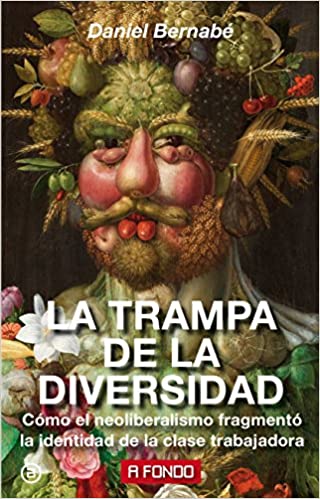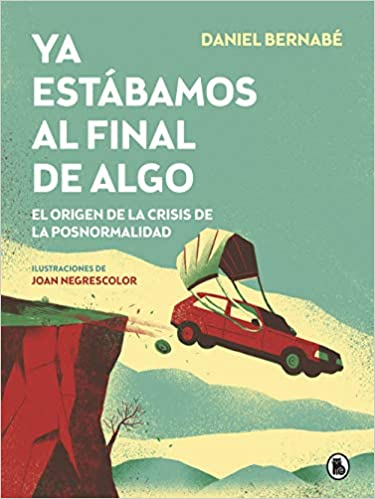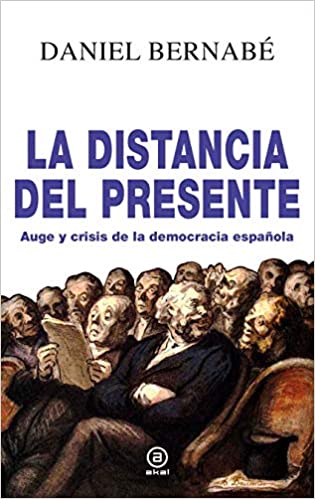I roto i nga porowhita rereke o nga tuhinga, kei reira ano hoki, ka kitea e tika ana te korero. Na te mea kaore nga kaiwhakaputa nunui e maia ki te whakaputa i ta te. Akene kei a koe ake ranei Raniera Panapa i tenei waa ko te mea kaore e tohu ki nga kaiwhakaputa kaore i whakapau ki nga pono ohorere ...
Ka taea e koe te whakaaro ko tenei kaituhi ehara i te pakiwaitara. Ehara i te mea motuhake anake. Na te mea i raro i te hainatanga a Daniel Bernabé i kitea e maatau a tuhinga roa de primer orden en cuanto al patio actual de la literatura española. Y es que el pensamiento crítico encaja en el ensayo como una pieza perfecta que sirve para el análisis. Además de ser útil para el despertar de conciencias, para el planteamiento de alternativas a círculos de poder donde siempre se las apañan para ir sofocando alternativas a lo que hay.
Na, ki te hiahia koe ki te tuku i to hinengaro ki te horoi i te wai matao pai, ka taea e koe te maia ki nga pukapuka a Daniel Bernabé. Ka tiimata tetahi ma te panui pukapuka pai ka mutu ka hoki ano ki te hinengaro koretake, kaore ranei i te taru ...
Ko nga pukapuka e toru na Daniel Bernabé i taunaki
Te mahanga kanorau
He karanga mo te kotahitanga ahakoa te wehenga kua whakatairangahia e te korikori o naianei, me te ahua ranei o te neoliberalism i te wehewehe o te tuakiri kaimahi ka mutu he kaiarahi kaiarahi ia mo nga tikanga pai? He nui rawa atu ranei te hara, i runga i te rereke, i taea e te tika te whakamahi i nga taupatupatu o te taha maui e kaha ana ki te awe i te whakaaetanga hapori o nga pakanga engari kaore o raatau kaupapa?
El activismo se esfuerza en buscar las palabras adecuadas para marcar la diversidad, creando un entorno respetuoso con nuestras diferencias, mientras el sistema nos arroja por la borda de la Historia. Ya no se busca un gran relato que una a personas diferentes en un objetivo común, sino exagerar nuestras especificidades para colmar la angustia de un presente sin identidad de clase.
I te mutunga o tetahi mea matou
I roto i tenei tuhinga roa tautohetia, tino mohio, whai kiko hoki, na Daniel Bernabé e whakaatu mai ki a maatau tetahi tuhinga roa he rite tonu te ahua o te awangawanga: kaore he mea i puta i te tau 2021 katahi ka miharo tatou. Na te mea ko te mate uruta, otira ko nga raru kaore ano kia puta i mua, ehara i te mea he aitua noa, engari he ngoikore kaore i kitea i roto i tetahi kaupapa i tino kaha rawa atu. Na te mea kua anga ke to taatau hapori, kua mutu taatau, a ko te mate uruta kare i te wahie, engari ko te kaiwhakaterenga o tenei pahuatanga nui e kitea ana e taatau.
He kaha te tohatoha a Bernabé i te take i tata ai te wa o ta tatou waa, ka ata tirotirohia e ia tenei raru kua tau mai hei whakarereke i nga mea katoa. Heoi, mai i te noho tonu ki nga amuamu me nga aue, kei te akiaki te kaituhi kia rangatira tatou mo ta tatou tutukitanga ana kua panui tatou i roto i tenei raru nui ko te mea angitu kia pai ake te mahi i muri o te mea i waihotia e tatou, ana, i runga ake nei katoa, kia kore ai tatou e kite i tetahi raru o tenei nui.
Te tawhiti mai i tenei wa
Quizá en el pasado no estén todas las soluciones, pero sí que podemos descubrir el cómo llegamos hasta donde estamos. Y el hecho de descubrir el salto generacional en la forma de afrontar los problemas generales acaba por despertar esa conciencia de que peor no se pudo haber evolucionado.
Este libro es mucho más que un viaje en el tiempo, una mera colección de hechos y cifras, de acontecimientos y personajes. Pretende ser un manual de supervivencia, un Códice para entender cómo hemos llegado hasta aquí y por qué somos como somos. Y para eso tenemos que indagar en nuestro pasado más reciente, en ese momento donde todo pudo cambiar –y cambio, de hecho– pero poderosas fuerzas se conjuraron para que, si algo tenía que variar, lo hiciera dentro de un orden. Su orden.



